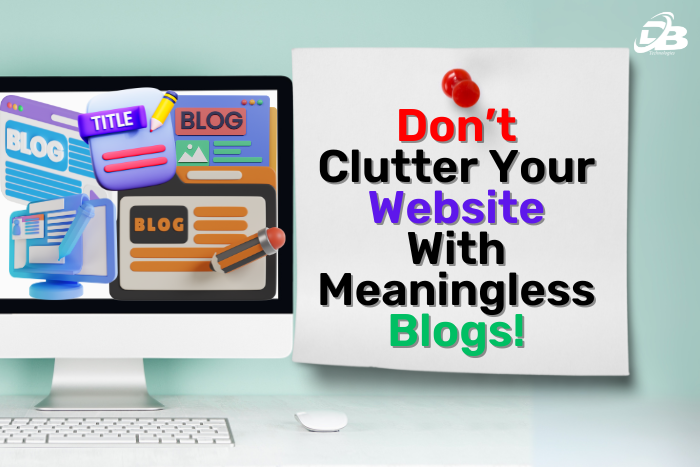
Alright, let’s have a chat. If you’ve been cranking out blog posts, articles, or whatever you want to call them, just for the sake of it, I need you to stop. Right now. Seriously, take a step back and think: “Why am I writing this? What’s the point?”
Because here’s the thing: In fact, most websites could do fairly well without more content and are probably too cluttered as it is.
I know, shocking, right? We’ve been trained for decades, “The king is content,” If you stop publishing more, you will rank higher.” However, I have watched too many sites commit a terrible mistake by writing and posting numberless blogs without direction. Places that would have been growing became insignificant because somewhere someone said, “Let’s just generate more content.
Why Writing Too Much Can Backfire
Let me break it down for you. Writing random content without a plan can actually hurt your site. Here’s why:
You’re Creating Dead Weight Every single page on your website carries a weight. If it’s useless or irrelevant, it becomes dead weight. Search engines look at your site as a whole, and if there’s a bunch of garbage pages hanging around, your entire site’s performance can tank.
Your Site Loses Focus Imagine your website as a person. Are you the expert on something specific, or are you just kinda good at everything? Sites that scatter their topics too much lose authority. Instead of being the go-to place for one thing, you become mediocre at a bunch of things. And guess what? Google doesn’t reward mediocrity.
You Cannibalize Your Keywords You ever hear about keyword cannibalization? It’s when you produce so many related articles that they begin to cannibalize each other or duplicate with each other. Instead of having one well-established and high-ranking page pushing its clip forward, you have five poor pages that barely scrape by and duke it out for some crumbs. That’s a recipe for disaster.
You are weak with Algorithm Updates Google is learning every year. Their updates especially the content oriented ones are harsh if your site is stuffed full with worthless garbage. It makes you to want to scream – in the words of the young generation – it’s like they are saying, ‘This is it! We are tired of all these nonsense!’
The Myth of “Just Publish More”
You know what really grinds my gears? All these people online bragging, “Here’s how I 10x’d my traffic in 24 hours!” They usually suggest cranking out AI-generated articles or writing low-effort blogs stuffed with keywords. And yeah, maybe it works for a hot second. But long-term? It’s a disaster.
I’ve worked with clients who followed that advice. They ended up with no extra sales, no revenue, and a ton of headaches trying to clean up the mess later. So, trust me, if it looks fast and easy, it’s probably a bad idea.
A Better Way to Approach Content
Now, don’t get me wrong. What I’m saying is that the ideas are not necessarily problematic, or the content itself. A carefully and thought-out piece of writing, such as an article which may even include pictures or – ideally – a video. That’s great. But if you’re going to create content, you must have a plan in place. Here’s how to do it the right way:
- Have a Clear Purpose Before you write anything, ask yourself: Why am I creating this? If you cannot decide, if you are in doubt, or if you have any shred of uncertainty left in you, then don’t go through with it. Occasionally meaningless information is what people can come across when they are surfing the web.
- Focus on What People Care About People really care about specific topics if there is no interest in the audience on what they are reading, then there is no purpose. What Works needs to be more than generic, boring programmatic content.
- Give Your Content a Scope Every piece of content should have a goal. Is it meant to drive traffic? Get leads? Build authority? Whatever it is, be clear about it from the start.
- Plan for the Long Run Some content will go out of date. That’s just life. You need a plan to either update it, repurpose it, or remove it when it’s no longer relevant. Trends fade, but your strategy shouldn’t.
Why Cleaning Up Your Site Matters
Here’s a secret: one of the most satisfying things I do is help clients clean up their messy websites. I’m talking about removing old, irrelevant content and consolidating similar topics into one powerhouse page.
The results? Clients see better rankings, faster site speeds, and a clearer focus for their audience. Plus, they learn how to avoid making the same mistakes again. That’s the key: education. It’s not just about cleaning up once; it’s about knowing how to manage your site moving forward.
Tools to Help You Stay Organized
One tool I always recommend is SEO Stack. It’s a lifesaver during audits. When I clean up a site, I don’t just give clients a list of to-dos. I set everything up in SEO Stack so they can track their progress. As they complete tasks, the tool monitors the impact. It’s like having a roadmap that shows you exactly how your efforts are paying off.
Final Thoughts
Look, I get it. Writing content seems like a job well done. But then again, if you don’t have a plan, you are just going round in circles. Instead of creating more worry about creating better.
If you are finding your site content is too much to handle or you have no idea where to begin, then it may be time for the audit. Trust me there is a whole lot of difference from the process of eliminating the clutter and creating something more constructive.
So, stop writing endless content for nothing. Start writing with purpose. And remember, sometimes less really is more.












